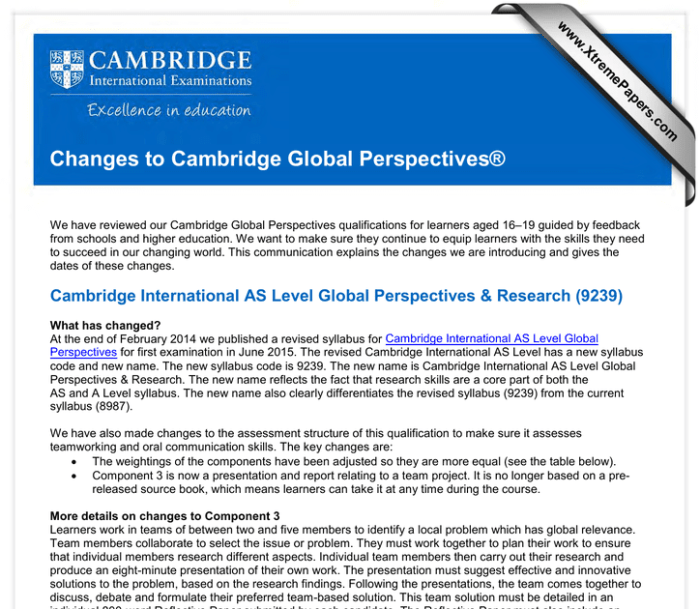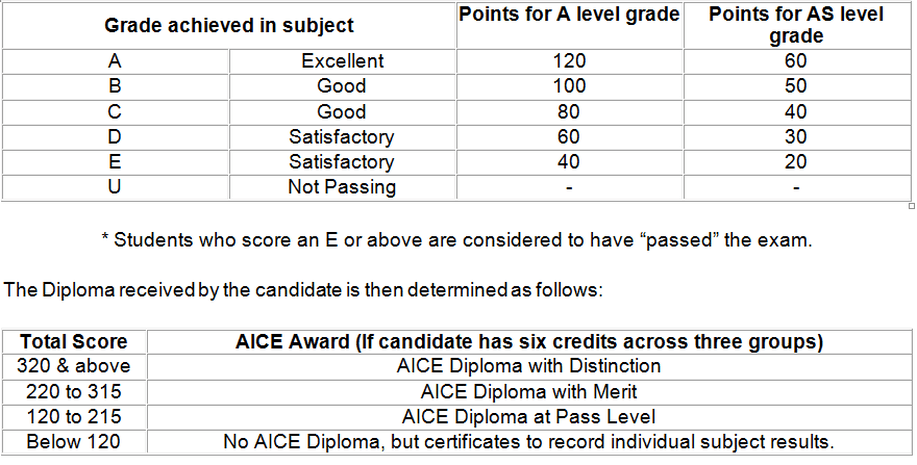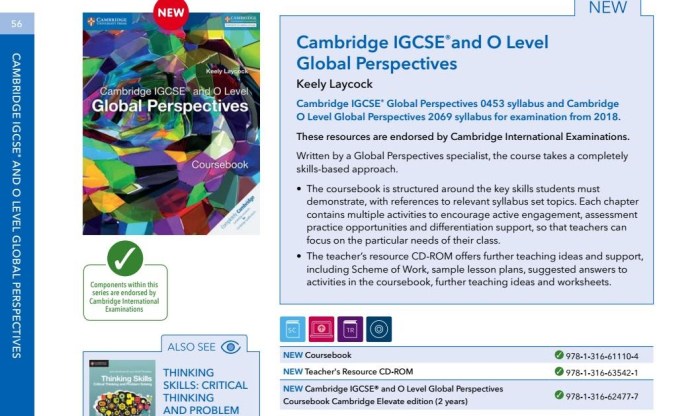AICE Global Perspectives Component 3 embarks on an intellectual journey, delving into the intricacies of globalization, its impact on individuals and societies, and the pressing challenges and opportunities it presents. This component equips learners with a comprehensive understanding of global interdependence, empowering them to navigate the complexities of the 21st century.
Exploring key concepts and theories, we unravel the dynamics of global interdependence, examining its far-reaching effects on economics, politics, and culture. By analyzing the major global challenges facing humanity, such as climate change and inequality, we uncover the opportunities that globalization offers for addressing these pressing issues.
Introduction: Aice Global Perspectives Component 3

The AICE Global Perspectives Component 3, titled “Research Investigation and Personal Statement,” is designed to assess students’ ability to conduct independent research on a topic of global significance, analyze and evaluate information from a variety of sources, and present their findings in a clear and concise manner.
The component covers key concepts and themes related to global issues, including:
- Interconnectedness and interdependence of the global community
- Cultural diversity and the challenges of globalization
- The role of technology in shaping global interactions
- The impact of globalization on local communities
- The challenges of sustainable development
Key Concepts and Theories

Global interdependence refers to the interconnectedness and mutual reliance of countries and peoples around the world. It encompasses economic, political, social, and cultural linkages that transcend national boundaries and shape global affairs. Global interdependence has profound implications for individuals and societies, influencing their well-being, security, and opportunities.
Theories of Globalization
Various theories attempt to explain the processes and consequences of globalization. These include:
- Modernization theory:Views globalization as a linear progression towards Western-style development and modernization.
- Dependency theory:Argues that globalization perpetuates economic and political inequalities between developed and developing countries.
- World-systems theory:Analyzes the global economy as a hierarchical system, with core, periphery, and semi-periphery countries.
Impact of Global Interdependence
Global interdependence has significantly affected different aspects of life:
- Economics:Interdependence has led to increased trade, investment, and economic growth, but also to global economic crises and inequality.
- Politics:Globalization has influenced international relations, promoting cooperation and conflict, and challenging national sovereignty.
- Culture:Interdependence has facilitated the spread of ideas, values, and cultural practices, leading to both homogenization and cultural diversity.
Global Challenges and Opportunities

Globalization presents humanity with unprecedented challenges and opportunities. Understanding these complexities is crucial for creating a more sustainable and equitable world.
The major global challenges include climate change, poverty, inequality, and conflict. Climate change threatens our planet’s ecosystems and livelihoods, while poverty and inequality perpetuate social and economic disparities. Conflict disrupts lives, destroys infrastructure, and hinders development.
Climate Change, Aice global perspectives component 3
- Rising sea levels, extreme weather events, and ecosystem disruption.
- Mitigation efforts involve reducing greenhouse gas emissions, transitioning to renewable energy, and promoting sustainable practices.
Poverty and Inequality
- Lack of access to basic necessities, education, and healthcare.
- Addressing poverty requires economic growth, social protection, and empowering the marginalized.
Conflict
- Political instability, ethnic tensions, and territorial disputes.
- Conflict resolution involves diplomacy, peacebuilding, and promoting human rights.
Opportunities of Globalization
Globalization offers opportunities to address these challenges by:
- Trade and Investment:Facilitating economic growth and reducing poverty.
- Technology Transfer:Sharing knowledge and innovations to enhance healthcare, education, and sustainable practices.
- Global Cooperation:Fostering international collaboration to address climate change, conflict, and other global issues.
Examples of Initiatives
- The Paris Agreement: A global framework to combat climate change.
- The Sustainable Development Goals: A United Nations initiative to end poverty, promote equality, and protect the environment.
- Non-governmental organizations (NGOs) working on poverty alleviation, conflict resolution, and environmental protection.
Global Perspectives and Citizenship

In an increasingly interconnected world, fostering a global perspective has become essential. It allows individuals to understand diverse perspectives, appreciate cultural differences, and address global challenges collaboratively.Global citizenship entails recognizing oneself as part of a global community, embracing shared values, and actively contributing to a more just and peaceful world.
Individuals bear responsibilities such as respecting human rights, promoting sustainable practices, and engaging in cross-cultural dialogue.
Responsibilities and Challenges of Global Citizenship
- Understanding and respecting diverse cultures, values, and beliefs.
- Promoting peace and cooperation through dialogue, empathy, and conflict resolution.
- Advocating for social justice, human rights, and environmental sustainability.
- Engaging in global issues and contributing to solutions through informed decision-making and actions.
- Balancing local and global perspectives to foster understanding and cooperation.
Contributions to a More Just and Peaceful World
- Volunteering for organizations dedicated to addressing global issues, such as poverty, hunger, or climate change.
- Supporting fair trade practices that promote sustainable development and economic empowerment.
- Advocating for policies that promote human rights, peace, and environmental protection.
- Engaging in cross-cultural exchange programs to foster understanding and empathy.
- Educating oneself and others about global issues and encouraging informed discussions.
FAQ Explained
What is the purpose of AICE Global Perspectives Component 3?
AICE Global Perspectives Component 3 aims to develop learners’ understanding of global interdependence, global challenges, and the responsibilities of global citizenship.
What are the key concepts covered in this component?
Key concepts include global interdependence, globalization theories, global challenges, and global citizenship.
How does this component contribute to global citizenship?
This component fosters a deep understanding of global issues and challenges, empowering learners to make informed decisions and contribute to a more just and peaceful world.